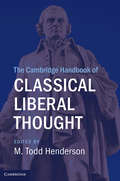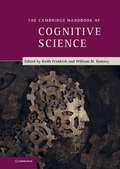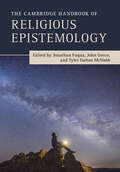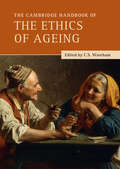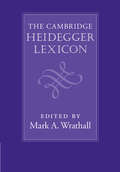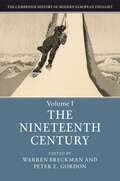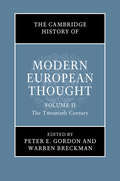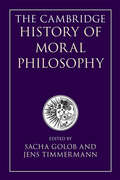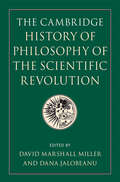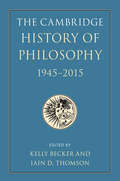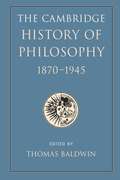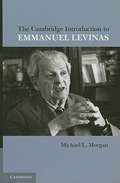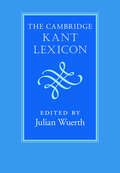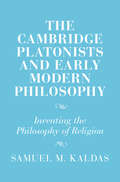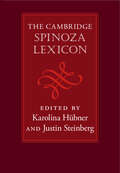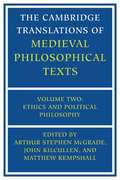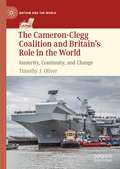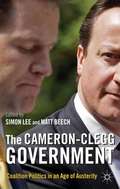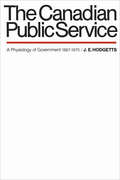- Table View
- List View
The Cambridge Handbook of Classical Liberal Thought
by M. Todd HendersonPolls suggest up to twenty percent of Americans describe their beliefs as 'libertarian', but libertarians are often derided as heartless Social Darwinists or naïve idealists. This illuminating handbook brings together scholars from a range of fields (from law to philosophy to politics to economics) and political perspectives (right, left, and center) to consider how classical liberal principles can help us understand and potentially address a variety of pressing social problems including immigration, climate change, the growth of the prison population, and a host of others. Anyone interested in political theory or practical law and politics will find this book an essential resource for understanding this major strand of American politics.
The Cambridge Handbook of Cognitive Science
by Keith Frankish William RamseyCognitive science is a cross-disciplinary enterprise devoted to understanding the nature of the mind. In recent years, investigators in philosophy, psychology, the neurosciences, artificial intelligence, and a host of other disciplines have come to appreciate how much they can learn from one another about the various dimensions of cognition. The result has been the emergence of one of the most exciting and fruitful areas of inter-disciplinary research in the history of science. This volume of original essays surveys foundational, theoretical, and philosophical issues across the discipline, and introduces the foundations of cognitive science, the principal areas of research, and the major research programs. With a focus on broad philosophical themes rather than detailed technical issues, the volume will be valuable not only to cognitive scientists and philosophers of cognitive science, but also to those in other disciplines looking for an authoritative and up-to-date introduction to the field.
The Cambridge Handbook of Religious Epistemology
by Tyler Dalton McNabb John Greco Jonathan FuquaThe Cambridge Handbook of Religious Epistemology, the first to appear on the topic, introduces the current state of religious epistemology and provides a discussion of fundamental topics related to the epistemology of religious belief. Its wide-ranging chapters not only survey fundamental topics, but also develop non-traditional epistemic theories and explore the religious epistemology endorsed by non-Western traditions. In the first section, Faith and Rationality, readers will find new essays on Reformed epistemology, skepticism and religious belief, and on the nature of evidence with respect to religious belief. The rich second section, Religious Traditions, contains chapters on Hindu, Buddhist, Islamic, Jewish, and Christian epistemologies. The final section, New Directions, contains chapters ranging from applying disjunctivism and knowledge-first approaches to religious belief, to surveying responses to debunking arguments. Comprehensive and accessible, this Handbook will advance the field for years to come.
The Cambridge Handbook of the Ethics of Ageing
by C. S. WarehamWe're all getting older from the moment we're born. Ageing is a fundamental and ubiquitous aspect of life. Yet in ethics, not much work is done on the questions surrounding ageing: how do diachronic features of ageing and the lifespan contribute to the overall value of life? How do time, change, and mortality impact on questions of morality and the good life? And how ought societies to respond to issues of social justice and the good, balancing the interests of generations and age cohorts? In this Cambridge Handbook, the first book-length attempt to stake this terrain, leading moral philosophers from a range of sub-fields and regions set out their approaches to the conceptual and ethical understanding of ageing. The volume makes an important contribution to significant debates about the implications of ageing for individual well-being, social policy and social justice.
The Cambridge Handbook of the Psychology of Aesthetics and the Arts
by Pablo P. L. Tinio Jeffrey K. SmithThe psychology of aesthetics and the arts is dedicated to the study of our experiences of the visual arts, music, literature, film, performances, architecture and design; our experiences of beauty and ugliness; our preferences and dislikes; and our everyday perceptions of things in our world. The Cambridge Handbook of the Psychology of Aesthetics and the Arts is a foundational volume presenting an overview of the key concepts and theories of the discipline where readers can learn about the questions that are being asked and become acquainted with the perspectives and methodologies used to address them. The psychology of aesthetics and the arts is one of the oldest areas of psychology but it is also one of the fastest growing and most exciting areas. This is a comprehensive and authoritative handbook featuring essays from some of the most respected scholars in the field.
The Cambridge Heidegger Lexicon
by Mark A. WrathallMartin Heidegger (1889–1976) was one of the most original thinkers of the twentieth century. His work has profoundly influenced philosophers including Jean-Paul Sartre, Simone de Beauvoir, Maurice Merleau-Ponty, Michel Foucault, Jacques Derrida, Hannah Arendt, Hans-Georg Gadamer, Jürgen Habermas, Charles Taylor, Richard Rorty, Hubert Dreyfus, Stanley Cavell, Emmanuel Levinas, Alain Badiou, and Gilles Deleuze. His accounts of human existence and being and his critique of technology have inspired theorists in fields as diverse as theology, anthropology, sociology, psychology, political science, and the humanities. This Lexicon provides a comprehensive and accessible guide to Heidegger's notoriously obscure vocabulary. Each entry clearly and concisely defines a key term and explores in depth the meaning of each concept, explaining how it fits into Heidegger's broader philosophical project. With over 220 entries written by the world's leading Heidegger experts, this landmark volume will be indispensable for any student or scholar of Heidegger's work.
The Cambridge History of Medieval Philosophy
by Robert Pasnau Robert Pasnau Christina Van Dyke Christina Van DykeThe Cambridge History of Medieval Philosophy comprises over fifty specially commissioned essays by experts on the philosophy of this period. Starting in the late eighth century, with the renewal of learning some centuries after the fall of the Roman Empire, a sequence of chapters take the reader through developments in many and varied fields, including logic and language, natural philosophy, ethics, metaphysics, and theology. Close attention is paid to the context of medieval philosophy, with discussions of the rise of the universities and developments in the cultural and linguistic spheres. A striking feature is the continuous coverage of Islamic, Jewish, and Christian material. There are useful biographies of the philosophers, and a comprehensive bibliography. The volume illuminates a rich and remarkable period in the history of philosophy and will be the authoritative source on medieval philosophy for the next generation of scholars and students alike.
The Cambridge History of Modern European Thought: Volume 1, The Nineteenth Century (The Cambridge History of Modern European Thought)
by Peter E. Gordon Warren BreckmanThe Cambridge History of Modern European Thought is an authoritative and comprehensive exploration of the themes, thinkers and movements that shaped our intellectual world in the late-eighteenth and nineteenth century. Representing both individual figures and the contexts within which they developed their ideas, each essay is written in a clear accessible style by leading scholars in the field and offers both originality and interpretive insight. This first volume surveys late eighteenth- and nineteenth-century European intellectual history, focusing on the profound impact of the Enlightenment on European intellectual life. Spanning twenty chapters, it covers figures such as Kant, Hegel, Wollstonecraft, and Darwin, major political and intellectual movements such as Romanticism, Socialism, Liberalism and Feminism, and schools of thought such as Historicism, Philology, and Decadence. Renouncing a single 'master narrative' of European thought across the period, Warren Breckman and Peter E. Gordon establish a formidable new multi-faceted vision of European intellectual history for the global modern age.
The Cambridge History of Modern European Thought: Volume 2, The Twentieth Century (The Cambridge History of Modern European Thought)
by Peter E. Gordon Warren BreckmanThe Cambridge History of Modern European Thought is an authoritative and comprehensive exploration of the themes, thinkers and movements that shaped our intellectual world in the late-eighteenth and nineteenth century. Representing both individual figures and the contexts within which they developed their ideas, each essay is written in a clear accessible style by leading scholars in the field and offers both originality and interpretive insight. This second volume surveys twentieth-century European intellectual history, conceived as a crisis in modernity. Comprised of twenty-one chapters, it focuses on figures such as Freud, Heidegger, Adorno and Arendt, surveys major schools of thought including Phenomenology, Existentialism, and Conservatism, and discusses critical movements such as Postcolonialism, , Structuralism, and Post-structuralism. Renouncing a single 'master narrative' of European thought across the period, Peter E. Gordon and Warren Breckman establish a formidable new multi-faceted vision of European intellectual history for the global modern age.
The Cambridge History of Moral Philosophy: Groundwork Of The Metaphysics Of Morals (Cambridge Texts In The History Of Philosophy Ser.)
by Jens Timmermann Sacha GolobWith fifty-four chapters charting the development of moral philosophy in the Western world, this volume examines the key thinkers and texts and their influence on the history of moral thought from the pre-Socratics to the present day. Topics including Epicureanism, humanism, Jewish and Arabic thought, perfectionism, pragmatism, idealism and intuitionism are all explored, as are figures including Aristotle, Boethius, Spinoza, Hobbes, Hume, Kant, Hegel, Mill, Nietzsche, Heidegger, Sartre and Rawls, as well as numerous key ideas and schools of thought. Chapters are written by leading experts in the field, drawing on the latest research to offer rigorous analysis of the canonical figures and movements of this branch of philosophy. The volume provides a comprehensive yet philosophically advanced resource for students and teachers alike as they approach, and refine their understanding of, the central issues in moral thought.
The Cambridge History of Philosophy in Late Antiquity
by Lloyd P. GersonThe Cambridge History of Philosophy in Late Antiquity comprises over forty specially commissioned essays by experts on the philosophy of the period 200–800 CE. Designed as a successor to The Cambridge History of Later Greek and Early Medieval Philosophy (ed. A. H. Armstrong), it takes into account some forty years of scholarship since the publication of that volume. The contributors examine philosophy as it entered literature, science and religion, and offer new and extensive assessments of philosophers who until recently have been mostly ignored. The volume also includes a complete digest of all philosophical works known to have been written during this period. It will be an invaluable resource for all those interested in this rich and still emerging field.
The Cambridge History of Philosophy in the Nineteenth Century (1790-1870)
by Allen W. Wood Songsuk Susan HahnThe latest volume in the Cambridge Histories of Philosophy series, The Cambridge History of Philosophy in the Nineteenth Century brings together twenty-nine leading experts in the field and covers the years 1790-1870. Their twenty-seven chapters provide a comprehensive survey of the period, organizing the material topically. After a brief editor's introduction, it begins with three chapters surveying the background of nineteenth century philosophy: followed by two on logic and mathematics, two on nature and natural science, five on mind and language, including psychology, the human sciences and aesthetics, four on ethics, three on religion, seven on society, including chapters on the French Revolution, the decline of natural right, political economy, and social discontent, and three on history, dealing with historical method, speculative theories of history and the history of philosophy. The essays are framed by an editor's introduction and a bibliography.
The Cambridge History of Philosophy of the Scientific Revolution
by David Marshall Miller Dana JalobeanuThe early modern era produced the Scientific Revolution, which originated our present understanding of the natural world. Concurrently, philosophers established the conceptual foundations of modernity. This rich and comprehensive volume surveys and illuminates the numerous and complicated interconnections between philosophical and scientific thought as both were radically transformed from the late sixteenth to the mid-eighteenth century. The chapters explore reciprocal influences between philosophy and physics, astronomy, mathematics, medicine, and other disciplines, and show how thinkers responded to an immense range of intellectual, material, and institutional influences. The volume offers a unique perspicuity, viewing the entire landscape of early modern philosophy and science, and also marks an epoch in contemporary scholarship, surveying recent contributions and suggesting future investigations for the next generation of scholars and students.
The Cambridge History of Philosophy, 1945–2015
by Iain D. Thomson Kelly BeckerThis landmark achievement in philosophical scholarship brings together leading experts from the diverse traditions of Western philosophy in a common quest to illuminate and explain the most important philosophical developments since the Second World War. Focusing particularly (but not exclusively) on those insights and movements that most profoundly shaped the English-speaking philosophical world, this volume bridges the traditional divide between 'analytic' and 'Continental' philosophy while also reaching beyond it. The result is an authoritative guide to the most important advances and transformations that shaped philosophy during this tumultuous and fascinating period of history, developments that continue to shape the field today. It will be of interest to students and scholars of contemporary philosophy of all levels and will prove indispensable for any serious philosophical collection.
The Cambridge History of Philosophy: 1870-1945
by Thomas BaldwinComprising over sixty specially commissioned essays by experts on the philosophy of this period, this anthology is designed to be accessible to non-specialists. The first part traces the history of philosophy from its remarkable flowering in the 1870s through to the early years of the twentieth century. After a brief discussion of the First World War's impact, the second part describes further developments during the first half of the twentieth century.
The Cambridge History of Postmodern Literature
by Brian Mchale Len Platt McHale, Brian and Platt, LenThe Cambridge History of Postmodern Literature offers a comprehensive survey of the field, from its emergence in the mid-twentieth century to the present day. It offers an unparalleled examination of all facets of postmodern writing that helps readers to understand how fiction and poetry, literary criticism, feminist theory, mass media, and the visual and fine arts have characterized the historical development of postmodernism. Covering subjects from the Cold War and countercultures to the Latin American Boom and magic realism, this History traces the genealogy of a literary tradition while remaining grounded in current scholarship. It also presents new critical approaches to postmodern literature that will serve the needs of students and specialists alike. Written by a host of leading scholars, this History will not only engage readers in contemporary debates but also serve as a definitive reference for years to come.
The Cambridge Introduction to Emmanuel Levinas
by Michael L. MorganThis book provides a clear and helpful overview of the thought of Emmanuel Levinas, one of the most significant and interesting philosophers of the late twentieth century. Michael L. Morgan presents an overall interpretation of Levinas's central principle that human existence is fundamentally ethical and that its ethical character is grounded in our face-to-face relationships. He explores the religious, cultural and political implications of this insight for modern Western culture and how it relates to our conception of selfhood and what it is to be a person, our understanding of the ground of moral values, our experience of time and the meaning of history, and our experience of religious concepts and discourse. Includes an annotated list of recommended readings and a selected bibliography of books by and about Levinas. An excellent introduction to Levinas for readers unfamiliar with his work, and even for those without a background in philosophy.
The Cambridge Kant Lexicon
by Julian WuerthImmanuel Kant is widely recognized as one of the most important Western philosophers since Aristotle. His thought has had, and continues to have, a profound effect on every branch of philosophy, including ethics, metaphysics, epistemology, aesthetics, political philosophy, and philosophy of religion. This Lexicon contains detailed and original entries by 130 leading Kant scholars, covering Kant's most important concepts as well as each of his writings. Part I covers Kant's notoriously difficult philosophical concepts, providing entries on these individual 'trees' of Kant's philosophical system. Part II, by contrast, provides an overview of the 'forest' of Kant's philosophy, with entries on each of his published works and on each of his sets of lectures and personal reflections. This part is arranged chronologically, revealing not only the broad sweep of Kant's thought but also its development over time. Professors, graduate students, and undergraduates will value this landmark volume.
The Cambridge Platonists and Early Modern Philosophy: Inventing the Philosophy of Religion (Cambridge Studies in Religion and Platonism)
by Samuel M. KaldasOften neglected by historians today, the seventeenth-century philosophers known as the Cambridge Platonists were recognised in their time as some of the most influential and controversial philosophers in England. Whereas most studies of the Cambridge Platonists have discussed their later careers, this book focuses on their early, formative years at Cambridge during the English Civil Wars. Samuel M. Kaldas explores how the Cambridge Platonists addressed issues central to philosophy of religion as we know it today through their engagement with early seventeenth-century religious controversies about predestination, the character and nature of God, and the role of reason in religion. His study serves as an accessible introduction to both the Cambridge Platonists, and to English religious controversies that contributed to the birth of the modern philosophy of religion. At the same time, Kaldas provides context for and fresh insights into the Cambridge Platonists' intellectual development and the coherence of their thought.
The Cambridge Rawls Lexicon
by Jon Mandle David A. ReidyJohn Rawls is widely regarded as one of the most influential philosophers of the twentieth century, and his work has permanently shaped the nature and terms of moral and political philosophy, deploying a robust and specialized vocabulary that reaches beyond philosophy to political science, economics, sociology, and law. This volume is a complete and accessible guide to Rawls' vocabulary, with over 200 alphabetical encyclopaedic entries written by the world's leading Rawls scholars. From 'basic structure' to 'burdened society', from 'Sidgwick' to 'strains of commitment', and from 'Nash point' to 'natural duties', the volume covers the entirety of Rawls' central ideas and terminology, with illuminating detail and careful cross-referencing. It will be an essential resource for students and scholars of Rawls, as well as for other readers in political philosophy, ethics, political science, sociology, international relations and law.
The Cambridge Spinoza Lexicon
by Justin Steinberg Karolina HübnerBaruch Spinoza is one of the most important and original thinkers of the modern period. His work inspired religious free-thinkers and political radicals, French Enlightenment philosophes, German Idealists, Russian Marxists, writers, and scientists. The Lexicon is a comprehensive compendium of entries on Spinoza's own concepts and associated historical figures. It cuts through the daunting profusion of Spinoza scholarship by supplying compact entries that contextualize Spinoza's thought, elucidate crucial concepts, and point the way to the relevant scholarly debates and studies. With entries by established and emerging scholars from North America, Australasia, and Europe, this is not only the most comprehensive and up-to-date picture of Spinoza scholarship, but also the most international and most diverse. It is a vital resource for novices and experts alike seeking to expand their knowledge of Spinoza.
The Cambridge Translations of Medieval Philosophical Texts: Volume II Ethics and Political Philosophy
by Arthur Stephen Mcgrade John Kilcullen Matthew KempshallThe eagerly-awaited second volume of The Cambridge Translations of Medieval Philosophical Texts will allow scholars and students access for the first time in English to major texts in ethics and political thought from one of the most fruitful periods of speculation and analysis in the history of western thought. Beginning with Albert the Great, who introduced the Latin west to the challenging moral philosophy and natural science of Aristotle, and concluding with the first substantial presentation in English of the revolutionary ideas on property and political power of John Wyclif, the seventeen texts in this anthology offer late medieval treatments of fundamental issues in human conduct that are both conceptually subtle and of direct practical import. Special features of this volume include copious editorial introductions, an analytical index, and suggestions for further reading. This is an important resource for scholars and students of medieval philosophy, history, political science, theology and literature.
The Cameron-Clegg Coalition and Britain’s Role in the World: Austerity, Continuity, and Change (Britain and the World)
by Timothy J. OliverThis is the first in-depth study of the foreign and defence policies of the Coalition, a government that saw the Conservatives restored to power for the first time since the Iraq War and the Liberal Democrats enter government for the first time. It explores the idea of Britain as a ‘Great Power’ since 1945 to show how the Coalition’s policies fitted into wider historical understandings of Britain’s role in the world. Drawing on a range of evidence from the time of the Coalition, it shows that this period was one of continued change in British foreign policy. The Coalition conducted the first strategic defence review since 1998, significantly reduced the funding allocations for defence and foreign affairs, raised overseas aid spending to record levels, engaged in overseas military action in two sovereign states (and were denied a chance to participate in another), as well as a wide array of other policies. This book argues that evaluating these events and the historical background of the Coalition is critical to understanding the current crises gripping British politics.
The Cameron–Clegg Government
by Simon Lee Matt BeechBeech and Lee provide a definitive guide to the coalition's first year in office. Offering compelling insights into their policy agenda, its chances of success, and a thought-provoking analysis of how the coalition government will affect the Conservatives, Liberal Democrats and Labour long-term.
The Canadian Public Service: A Physiology of Government 1867-1970
by John HodgettsThe Canadian Public Service is now so large that it employs over ten per cent of Canada's labour force, and among its many boards, commissions, and corporations there is a constant juggling of conventional departmental portfolios in an effort to keep pace with changing public priorities. As these bureaucracies penetrate our lives more and more, there is increasing need for a study which describes and explains them. This book is the first to offer the necessary clarification. It says nothing about public servants themselves; rather it focuses on the physiognomy and physiology of the structures in which they work and through which programmes are allocated, work distributed, and policy decisions made for all of Canada. It also examines the way in which environmental forces have helped to shape our so-called administrative culture, as well as the monumental difficulties that are involved in co-ordinating the administration of this vast country, three-quarters of whose public service concerns are located outside the capital. It concludes that all of our public organizations, the public service has proven the most responsive to the forces of change, but that it has been so caught up in structural and managerial adaptation that its capacity to concern itself with substantive policy issues has been subverted.
